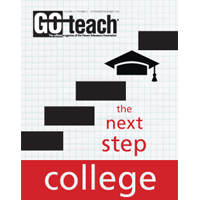16 May2014
By Saroja Barnes
A new report from the National Education Association (NEA) is the latest in a recent flood of attention to the lack of diversity among the nation’s teaching workforce.
Earlier this week, NEA released Time for a Change: Diversity in Teaching Revisited, which explores the need to recruit and retain teachers of color and the political context that has diminished interest in and initiatives toward meeting the goal. According to Segun Eubanks, director of NEA’s Teacher Quality Department, “This is not a new concern.” The paper examines the progress—or lack of progress—made to address diversity of the teaching workforce and uses the findings as a basis for recommending change.
13 May2014
By Elizabeth Ross
 The Collaboration for Effective Educator Development, Accountability, and Reform (CEEDAR) Center, a national center funded by the U.S. Department of Education Office of Special Education Programs, seeks state partners—including state education agencies (SEAs) and educator preparation programs (EPPs)—to work collaboratively on teacher and leader effectiveness across the career continuum to help students with disabilities achieve college and career readiness in inclusive settings.
The Collaboration for Effective Educator Development, Accountability, and Reform (CEEDAR) Center, a national center funded by the U.S. Department of Education Office of Special Education Programs, seeks state partners—including state education agencies (SEAs) and educator preparation programs (EPPs)—to work collaboratively on teacher and leader effectiveness across the career continuum to help students with disabilities achieve college and career readiness in inclusive settings.
States may apply to the CEEDAR Center for intensive technical assistance for up to 4 years. Grantees will create strategic partnerships among SEAs and EPPs to support educator preparation faculty and administrators, researchers, state policy makers, and school-based professionals in building and sustaining an aligned, coherent, and systemic approach to personnel preparation. An online application must be submitted by August 1 by the state’s chief school officer or designee, in collaboration with the partnering SEA and EPPs.
13 May2014
By Saroja Barnes
 Last week, the Northwest Evaluation Association, in cooperation with Grunwald Associates, released a new report, Make Assessment Matter. The report follows up on a study done by the group 2 years ago of assessment perceptions held by parents, teachers, and district administrators.
Last week, the Northwest Evaluation Association, in cooperation with Grunwald Associates, released a new report, Make Assessment Matter. The report follows up on a study done by the group 2 years ago of assessment perceptions held by parents, teachers, and district administrators.
In the current landscape where standards, accountability assessments, and use of student value-added measures to evaluate teachers prevail, the researchers expanded survey respondents to include students to better understand their awareness and what value—if any—they perceive in educational testing.
Based on survey data collected from more than 1,000 students in grades 4-12, more than 1,000 PK-12 classroom teachers, and 200 district administrators, the report highlights six key findings:
06 May2014
By Kristin McCabe
Want to make sure the Council for the Accreditation of Educator Preparation (CAEP) hears from the field? A new survey asks teacher educators to help shape CAEP’s advanced standards, weigh in on preferred accreditation supports, and more.
In an announcement posted yesterday, CAEP invites institutions to provide feedback via an online survey. Part of the instrument is described as “a critical research project to ensure the highest level of service and support to institutions,” while other questions seek input on newly drafted standards for preparation programs at the advanced level. Participation in the survey is anonymous.
You have only a brief window to respond, so don’t delay: The survey is open through Thursday, May 15.
08 Apr2014
By Kristin McCabe
Policy makers should allow more time for schools to implement the Common Core State Standards (CCSS), according to a statement released today by the Learning First Alliance.
The Alliance—a partnership of leading education organizations, including AACTE—wants policy makers to make sure instructional alignment and various supports are established before they apply high-stakes consequences to CCSS test results.
In support of this agenda, a new web site houses implementation success stories, such as podcasts from selected states, and a collection of other implementation resources.
25 Mar2014
By Jessica Milton
On March 19, I attended the release event of Beginners in the Classroom: What the Changing Demographics of Teaching Mean for Schools, Students, and Society, a report that examines the causes, conditions, and consequences of the rise of less-experienced teachers in the classroom.
Issued by the Carnegie Foundation for the Advancement of Teaching, the report cites research showing that the shift toward greater numbers of inexperienced teachers has “serious financial, structural, and educational consequences for American public education—straining budgets, disrupting school cultures, and, most significantly, depressing student achievement.” (AACTE, too, seeks to address these problems through its Educator Workforce Advisory Task Force, an initiative of the new Innovation Exchange.)
25 Mar2014
By Kristin McCabe
We’ve just posted video recordings of all 10 major forums held during AACTE’s 66th Annual Meeting in Indianapolis.
These videos, housed in AACTE’s Learning Center, are accessible only to conference registrants. Other available videos include one from the Town Hall Meeting (open to all AACTE members), two from other general sessions (open to the public), and two installments of “AACTE News 14” (open to the public).
In other exciting news, we’ve heard from our Indianapolis community partner School on Wheels that AACTE attendees donated $1,500 to that organization during the conference. Many thanks to all who contributed!
11 Mar2014
By Tim Finklea
The Council for the Accreditation of Educator Preparation (CAEP) has released draft evidence guides along with an application for educator preparation providers (EPPs). The evidence guides are designed to provide practical advice for EPPs as they structure their self-study under the CAEP standards and prepare for a site visit.
The following drafts are available:
14 Jan2014
By Alicia Ardila-Rey
If you are interested in international education and in preparing globally competent teachers, here are some resources and opportunities to consider:
Summer 2014 Fulbright-Hays Seminars Abroad Program in China
The Fulbright-Hays Seminars Abroad Program provides opportunities for overseas experiences to teachers and other PK-12 personnel, teacher educators, and administrators with responsibilities for program or curriculum development in fields related to humanities, languages, and area studies. Seminars are designed to provide a broad and introductory cultural orientation to a particular country. The program is geared toward educators with little or no experience in the host country who demonstrate the need to develop and enhance their curriculum through short-term study and travel abroad.
17 Dec2013
By Tim Finklea
On December 12, the National Network of State Teachers of the Year (NNSTOY) and Pearson’s Center for Educator Effectiveness released a research report at an interactive launch event at the Thomas B. Fordham Institute.
At the event, a panel of several former teachers of the year joined American Enterprise Institute Resident Scholar Frederick Hess to discuss the conditions necessary to develop sustainable career pathways that might make teaching a more attractive career option for a new generation of educators. The panel also discussed the benefits of teacher preparation resources such as edTPA and the role of educator preparation programs in enhancing teacher leadership roles.
16 Dec2013
By Jessica Milton

The editors of Go Teach magazine recently turned to AACTE to help prospective teacher candidates navigate the proliferation of conflicting visions of what constitutes effective teacher preparation. In response, my colleague Saroja Barnes and I coauthored an article for the magazine that ran in the November/December issue as the cover story, “How to Choose an Effective Teacher Preparation Program.”
Based on relevant research on teacher preparation, the article points to several key components of high-quality programs that potential teacher candidates should consider. Structured by seven key questions, the article guides prospective candidates to think through the following issues when exploring teacher preparation pathways:
05 Dec2013
By Mary Harrill
On December 10, the National Council on Teacher Quality (NCTQ) will release a report on how well educator preparation programs prepare teachers to effectively manage classrooms. The report will include an analysis of 122 programs, judging them based on what NCTQ has identified as the five most important classroom management strategies:
- “Rules: Establish and teach classroom rules to communicate expectations for behavior.
- Routines: Build structure and establish routines to help guide students in a wide variety of situations.
- Praise: Reinforce positive behavior, using praise and other means.
- Misbehavior: Consistently impose consequences for misbehavior.
- Engagement: Foster and maintain student engagement by teaching interesting lessons that include opportunities for active student participation.”
AACTE has no further information about the report at this time, but we’ll keep you posted as we learn more. Information on past NCTQ reviews is available here.
25 Nov2013
By Sarah Pinsky
Last summer in its 2013 Teacher Prep Review, the National Council on Teacher Quality (NCTQ) set forth recommendations for state and local policy makers who want to see the ratings increase for educator preparation programs in their jurisdictions. One of these recommendations was to “revamp current inspections of teacher preparation programs, performed as a condition of program approval.” Positing that neither state program approval site visits nor national accreditor site visits have proven to be meaningful, NCTQ recommended that states employ independent inspectors, along the lines of the British inspectorate model for preparation programs, to conduct program evaluation site visits and program evaluations.
06 Nov2013
By Sarah Pinsky
In the last couple of weeks, many AACTE members have been contacted by the National Council on Teacher Quality (NCTQ) inviting them to submit new materials by December 15 for the council’s 2014 review of education schools.
Of note in NCTQ’s communication with members is that the 2014 review will be a ranking, rather than a rating, of programs, and that programs that don’t set a minimum GPA entry requirement can meet the selectivity standard by showing that the average GPA of admitted candidates is a 3.3 or higher.
AACTE will continue to support members’ decision-making regarding their engagement with NCTQ and to represent members’ concerns about the organization and the work it produces. Members can find materials, including AACTE’s statement on the release of NCTQ’s 2013 review, in the NCTQ-U.S. News resource section of AACTE’s web site.
30 Oct2013
By Aimee Hall
 The Midwest Regional Educational Laboratory at American Institutes for Research will host a free webinar Wednesday, November 20, 1:30-3:00 p.m. CST, to address the question of how we prepare preservice teachers to work in online and blended settings.
The Midwest Regional Educational Laboratory at American Institutes for Research will host a free webinar Wednesday, November 20, 1:30-3:00 p.m. CST, to address the question of how we prepare preservice teachers to work in online and blended settings.
“Making Connections: Teaching Preservice Teachers to Teach Online” will feature Kathryn Kennedy, director of research at the International Association for K-12 Online Learning, and Leanna Archambault, assistant professor at Arizona State University, who coauthored the 2012 study Offering Preservice Teachers Field Experiences in K-12 Online Learning: A National Survey of Teacher Education Programs.










 The Midwest Regional Educational Laboratory at American Institutes for Research will host a free webinar Wednesday, November 20, 1:30-3:00 p.m. CST, to address the question of how we prepare preservice teachers to work in online and blended settings.
The Midwest Regional Educational Laboratory at American Institutes for Research will host a free webinar Wednesday, November 20, 1:30-3:00 p.m. CST, to address the question of how we prepare preservice teachers to work in online and blended settings.